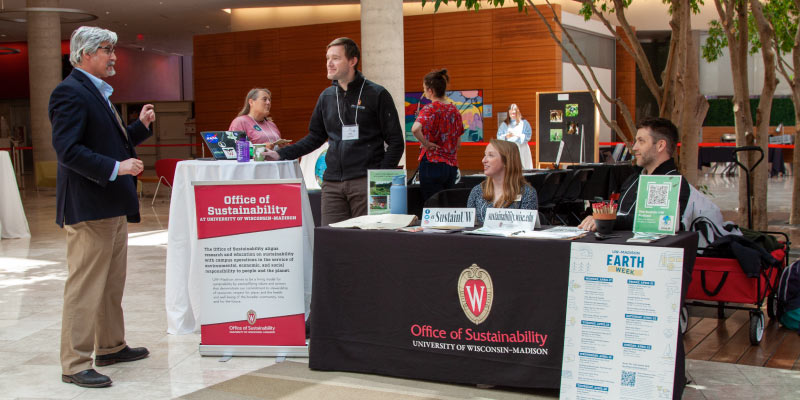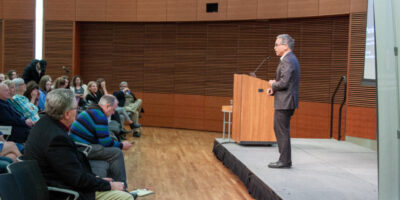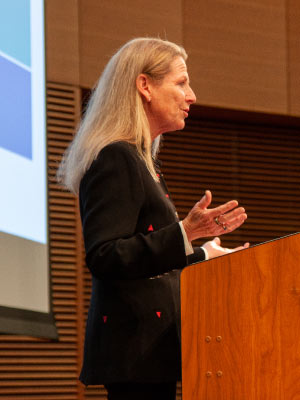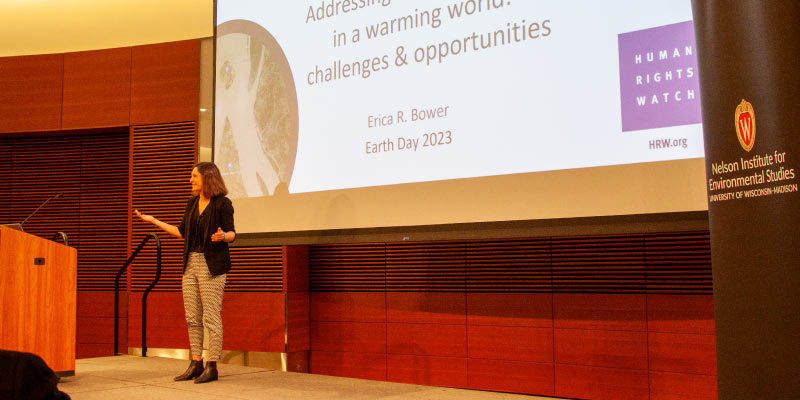
If you’re like most people, the topic of climate change doesn’t fill you with the warm and fuzzies. But at the Nelson Institute’s Earth Day 2023: Species on the Move, the message surrounding climate change was one of hope. “I am an optimist,” said plenary speaker Patrick Gonzalez, “and it’s a science-based optimism.” The two-day event brought together learners from across the globe to hear from leading experts, including dozens of UW–Madison faculty and staff.

Gonzalez, executive director of UC–Berkeley’s Institute for Parks, People, and Biodiversity, opened the event with a discussion on human-caused climate change, highlighting recent changes in global surface temperature, biodiversity, and wildfire patterns, to name a few. “I know that was a lot of bad news,” Gonzalez said to a response of muffled laughter. “But it’s going to get a lot better when we talk about solutions.” Among those solutions, Gonzalez hammered home the amount of change that can come from people swapping individual cars for walking, biking, and using public transport. “You can take meaningful action on climate change by walking, biking, or taking public transit,” Gonzalez shared. “This can cut your personal transportation carbon emissions up to 99 percent.”

After learning about the human-caused effects of climate change from Gonzalez, Ryan Phelan — cofounder and executive director of Revive & Restore — took the stage to discuss innovative solutions of those effects: using genetics as a key tool in wildlife conservation. Phelan opened with an image of an oil painting by Isabella Kirkland that shows 43 individual species, all of which were brought back from near extinction. “Traditional conservationists made this happen by two primary methods,” Phelan said. “One, protecting habitat, and two, reducing overhunting, overharvesting pressures. These were the tools of the trade of the 20th century.” Phelan then expanded into the new and developing tools of the trade, including using existing tools like advanced reproductive techniques and genome editing for wildlife conservation.
Rounding out the plenary sessions, Erica Bower, a climate displacement researcher at Human Rights Watch, focused on the theme of Species on the Move by discussing the challenges and opportunities of human mobility in our warming world. She opened with a personal story about her aunt and uncle who awoke on the morning of October 8, 2017, to the devastating Tubbs Fire in Northern California. “This is the charred landscape from the Tubbs fire the next day,” Bower said, changing the slide from an aerial view of a normal, suburban neighborhood, to one where the houses had all turned to piles of ash. “My aunt and uncle had the resources and resilience to bounce back from climate displacement. But they’re the lucky ones.” Bower’s talk concluded with three considerations to move forward in addressing climate change-related human mobility: recognize that it’s complex, that there’s no one-size-fits-all solution, and that we need greater coordination across sectors to truly make a difference.

Between talks, the crowd spilled out of the Discovery Building’s DeLuca Forum into the sunlit exhibit hall to network and visit tables hosted by the event’s campus and community partners. Some played species trivia on an inflatable globe with the Nelson Institute’s Environmental Professional Programs. Others learned about the effects of petroleum on plants at the Wisconsin Energy Institute’s table. Current UW students learned about job and internships from organizations like the Sierra Club, the Natural Resources Foundation, and Sustain Dane.
After an invigorating day of in-person learning, Earth Day 2023 went online for its Wednesday programming, featuring a collection of virtual breakout sessions led by UW–Madison faculty, staff, and affiliates on areas of expertise from forest dynamics to pandemic preparedness to naming processes and binary systems.
Andrea Akall’eq Burgess, the Nature Conservancy’s global director of conservation in partnership with Indigenous peoples and local communities, closed out the event with a well-rounded discussion on humans on the move and how we can reset our relationships with nature by indigenizing conservation efforts. Her vision? “In 2030, critical lands and waters around the world are sustainably managed by the communities who depend on them for their spiritual and subsistence needs, according to their self-determined visions,” said Burgess.
Catch up on this year’s plenary and breakout sessions, and be the first to hear about Earth Day 2024 by joining our email list! (Check the “I would like to hear about upcoming Nelson Institute events” box.)